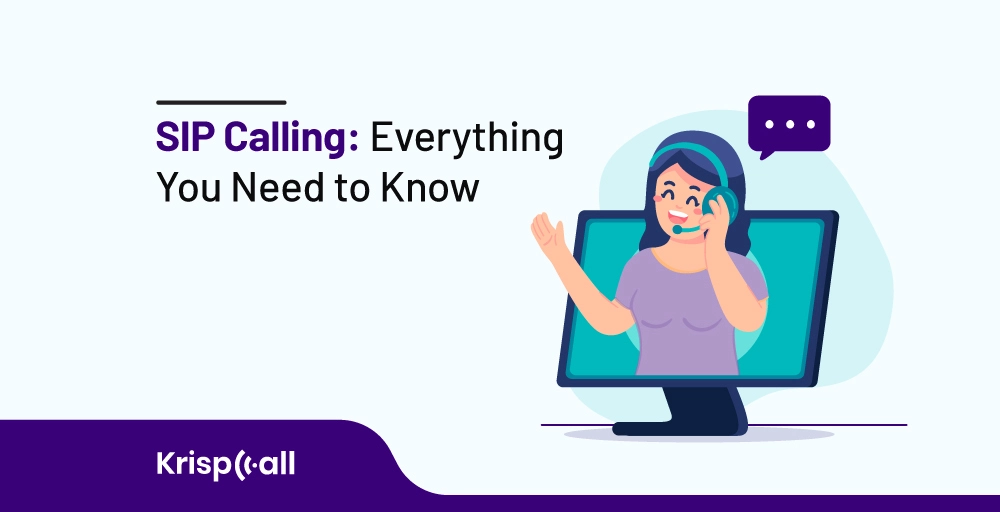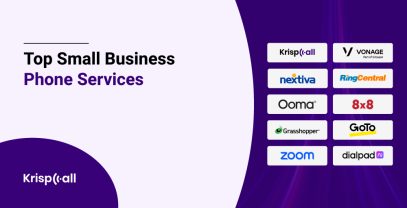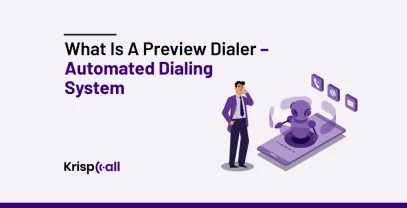Are you tired of tangled wires and clunky phone systems?
If so, forget about these phone systems and immerse in the use of SIP calls, the future of phone systems.
Get rid of the outdated and expensive calling platform and introduce SIP calling for crystal-clear calls, flexibility, and cost-saving.
But hold on, what exactly is this SIP Calling?🤔 If you are still confused, worry not, we will cover everything you need to know about SIP calling.
So, whether you are an entrepreneur looking for an effective business phone system or a business owner who is tired of the hefty phone bills this blog might help you.
What is SIP calling?
Session Initiation Protocol, or simple SIP, is a communication protocol that uses IP devices to initiate, establish, maintain, and terminate a communication session.

SIP plays a vital role in Internet communication, which includes both voice and video. Moreover, SIP is one of the most common protocols for VoIP (Voice over Internet Protocol) communication.
Integrating Session Initiation Protocol (SIP) calling into your business communication setup can bring big improvements. Some major benefits are:
- cost-effectiveness: SIP calls often come with lower charges compared to telephone services. Moreover, SIP calling allows for communication by combining voice, video, and messaging services.
- Scalable: It enables businesses to adjust their communication channels based on their requirements. Additionally, advanced functionalities such as call forwarding, voicemail, and auto attendants play a role in improving the communication experience of any business.
How does SIP calling Work?
Any traditional phone system has 3 core parts. The first one is Private Branch Exchange or simple PBX, a system used for managing the inbound and outbound calls. The second part is the Primary Rate Interface, or PRI, a system used for connecting the calls to the Public Switched Telephone Network.
Finally, the third part is PSTN or Public Switched Telephone Network, a system that routes calls to the designated location after call initiation. SIP calling works similarly.
Here is how an SIP calling works, it requires SIP trunking, a stable and strong internet connection, an SIP address, and a Real-time Transport Protocol. First, the SIP trunk replaces the need for PRI and connects the muti-channel communication with PBX for routing the calls via the Internet.
Likewise, SIP calling requires a unique SIP address and a transport protocol to send and receive audio signals.
Configuring SIP calling for Business is a very simple process. Below are the basic steps that you can follow to set it up.
How to set up SIP Calling in Business?
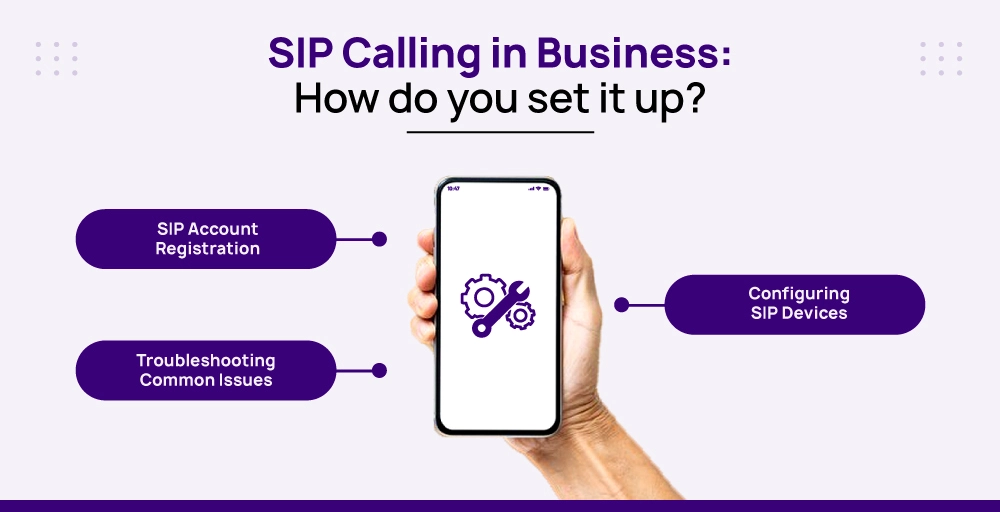
1. SIP Account Registration
To incorporate SIP into your business communication, it is necessary to have a SIP account. To obtain one, select a service provider. Complete the registration process by submitting the required information and documents for verification. Once completed, you will receive your account details.
After obtaining your account, you can access the SIP registration page to customize and explore the features according to your requirements.
2. Configuring SIP Devices
Once you’ve logged in with your account details, the next step is to identify the devices that are compatible with the SIP call. These devices could include PBX systems, IP phones, or even softphones. Once you’ve identified them, proceed with configuring the SIP devices and adjusting the settings, including features and codecs.
Once these steps are completed, you’ll be ready to start making calls using the configured SIP devices. However, the process of making SIP calls does not end here, as you might face some issues during its use.
3. Troubleshooting Common Issues
After the implementation of the process, you might face a number of challenges in the operation of the SIP devices. Here are the troubleshooting measures for some common issues that you might encounter while using SIP.
- Use Quality of Service (QoS) to prioritize the SIP traffic.
- Set firewall and other security parameters to allow SIP communications.
- Verify and ensure codec compatibility with the SIP service.
- Keep the devices up-to-date to ensure smooth functioning.
How to set up a SIP call on Android?
To set up a SIP calling on Android, open settings > click on Connections > select Internet calling or SIP account > save settings.
Here is a detailed step-by-step process for setting up a SIP call on Android.
Step 1: Open the “Settings” app on your Android device.
Step 2: Navigate to “Connections” or “Network & Internet.”
Step 3: Select “Internet calling” or “SIP accounts.”
Step 4: Choose “Add Account” and enter the SIP account details provided by your service provider.
Step 5: Save the settings, and your SIP account is now set up.
How to set up a SIP call on an iPhone?
To set up a SIP calling on an iPhone, download a SIP app > open and navigate the settings > enter SIP account details > save settings.
Here is a detailed step-by-step process for setting up a SIP call on Android.
Step 1: Go to the App Store and download a SIP app like Krispcall.
Step 2: Open the app, navigate to settings, and choose “Accounts” or “SIP Accounts.”
Step 3: Enter the SIP account details provided by your service provider.
Step 4: Save the settings, and your SIP account is ready for use.
SIP Calling Vs WIFI Calling: What is the difference?
SIP calling uses the Session Initiation Protocol over the Internet to enable calls over the Internet, while Wi-Fi calling uses a Wi-Fi network to connect voice calls over the Internet. Although both SIP calling and Wi-FI calling enable voice communication, they have differences in operation.
| Basis | SIP calling | Wi-Fi Calling |
| Protocol | SIP calling uses the Session Initiation Protocol. | Wi-Fi calling uses standard cellular voice protocols |
| Compatibility | Compatible with various devices and applications supporting SIP. | Usually supported by specific carriers and devices. |
| Roaming Capability | Works globally with internet access. | Limited to regions with Wi-Fi coverage. |
| Coverage | Dependent on internet availability. | Limited to areas with Wi-Fi coverage. |
4 Best SIP Calling Software Providers in 2024
1. GoContact
GoContatct is a user-friendly cloud phone system catering to startups and small businesses that offers SIP calling features. It provides SIP calling and some other advanced features. In addition, it offers integrations with CRM and project management tools. Moreover, it offers a user-friendly interface and easy-to-use settings.
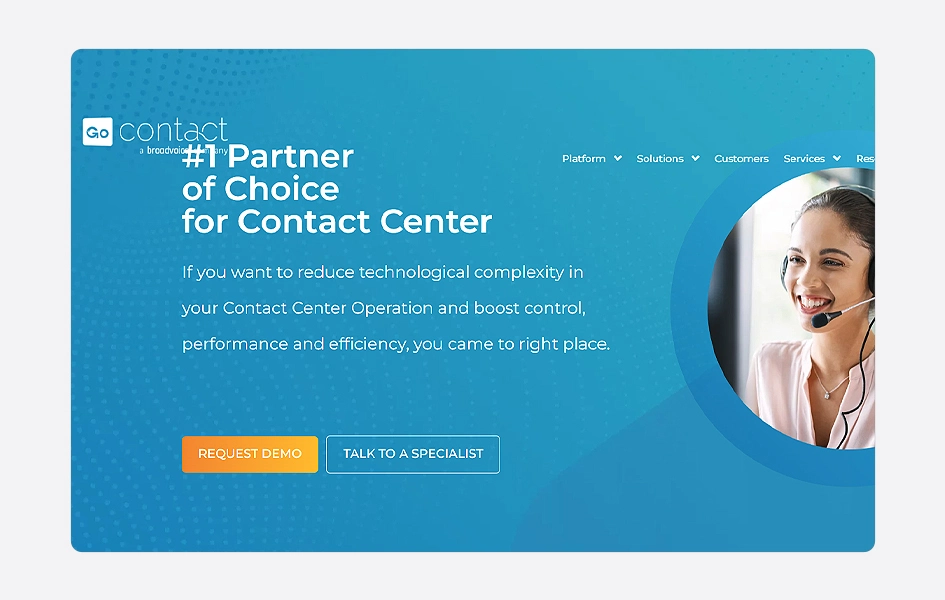
This provider is perfect for startups and small businesses. However, it can cater to medium and large businesses as well. Remember, GoContact has limited call handling, reporting, and analytics features. So, make sure that it has the features you need in your business.
Features
- Virtual Phone Numbers
- Call Forwarding
- Call Recording
- Voicemail Transcription
- Call Analytics
Pricing
Starts at $19 per user per month.
2. CloudTalk
Cloudtalk is a popular call center software that specializes in data and analytics, automation, scalability, and CRM integration. With service in over 12 countries, Cloudtalk is ideal for medium- to large-sized businesses. In addition, it has one of the highest number of integration options, which can cater to the needs of any business communication.

Furthermore, it offers a free demo for users before making any purchases. However, it is worth noting that CloidTalk does not have the best customer service in the market.
Features
- International numbers
- SMS / Text messages
- Interactive Voice Response
- Call Monitoring
- Click Call
Pricing
- Starts at $15 per user per month.
3. Phone.com
Phone.com is a flexible and scalable cloud phone system suitable for businesses of all sizes. It offers SIP trunking with a number of other sophisticated features. It has established itself as a SIP call provider due to its pricing and commitment to data privacy. Businesses of any size or industry can rely on it for their communication needs.
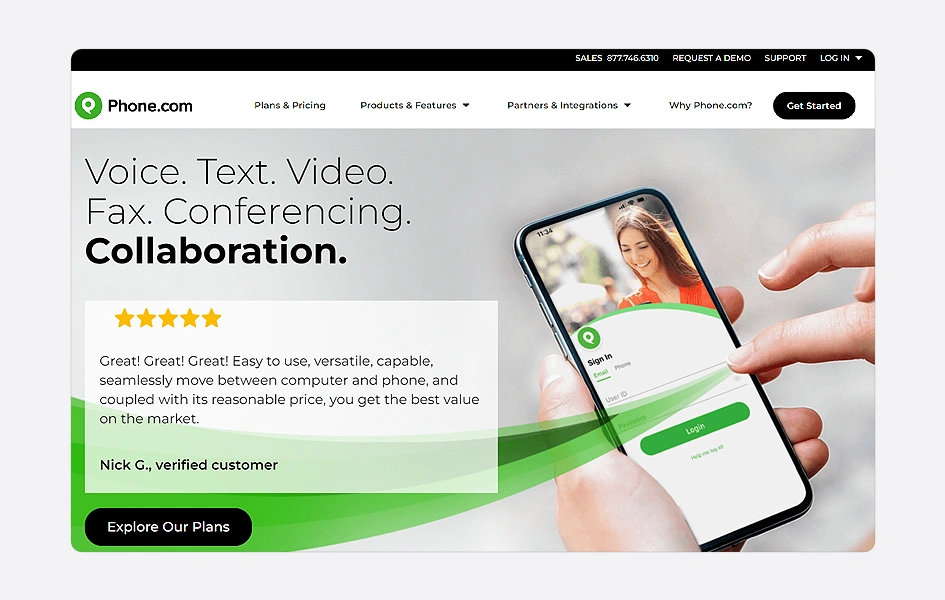
Furthermore, it meets the requirements for HIPAA Compliance, ensuring security and data protection. However, it does have some limitations in terms of user management options and a lengthy contract commitment.
Features
- Local Numbers
- Toll-FreeNumbers
- Video Meetings
- Live Receptionist
- International Rates & Numbers
Pricing
Starting at $12.74 per user per month
4. 8×8
Lastly, 8×8 has made it into the list of top five SIP call providers. 8×8 is a well-known provider of cloud and contact center software. It offers a flexible cloud-based phone system that caters to the communication requirements of businesses regardless of their size. This provider offers a number of advanced features, including contact center capabilities.
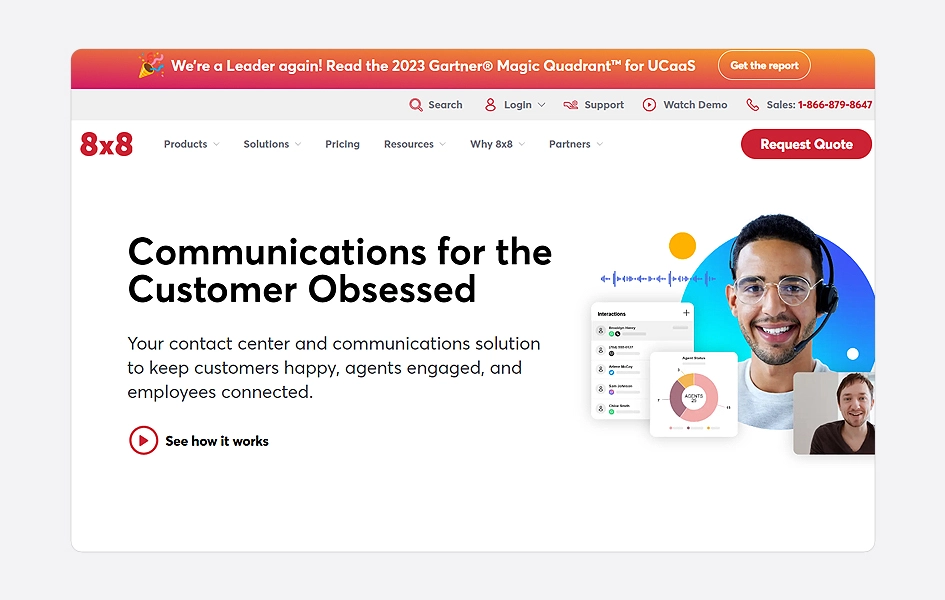
It only gets better as it integrates with CRM and other business applications. However, its higher pricing and learning curve may deter some smaller businesses or those with limited technical expertise. Moreover, users may need more time to navigate the application and software.
Features
- Virtual Phone Numbers
- Call Forwarding
- IVR
- Call Recording
- Call Conferencing
- Call Analytics
Pricing
Starts at $20 per user per month
What are the future trends of SIP Calling?
In simplest terms, a SIP phone refers to a device that uses the Session Initiation Protocol for initiating, establishing, and ending voice and video communication sessions over IP networks or simply the Internet.
We can anticipate that the SIP technology will become closely integrated with 5G networks. This can result in improved connectivity and faster communication. Moreover, the combination of SIP and Artificial Intelligence (AI) is predicted to enable call routing and personalized communication experiences.
Additionally, the integration of SIP into the Internet of Things (IoT) might lead to seamless device connectivity. This can help in creating an efficient communication environment.
Final Words
Summing up, SIP Calling has transformed communication with its cost-effective, flexible, and scalable features. It is high time that every business focuses on integrating SIP into their business communication. You can go through the process of setting up SIP in business as mentioned above. Moreover, you can set it up on a specific device.
FAQs
Is SIP calling more secure than Traditional Phone calls?
No, traditional phone calls are more secure than SIP calling because SIP calling is done through the Internet, which attracts a number of security dangers. However, SIP users can use various security measures like Encryption, Intrusion Detection and Prevention Systems (ISPS), and firewalls to protect sensitive data.
How much does it cost to install a SIP calling for your business?
If you are planning to establish a new phone system and install an SIP call, here is a breakdown of the general cost.
- SIP trunk: $20 to $65 per month per trunk.
- Porting fees: $15 to $30 per number.
- Equipment: $100 to $500 per phone.
- Installation: $100 to $500.
However, if you are planning to take just the service, it typically costs between $15 and $50 per month per user.
What do you mean by SIP caller and SIP codes?
A SIP caller, also referred to as a SIP user agent (UA), is a software or device that assists in initiating and handling VoIP (Voice over Internet Protocol) calls through the Session Initiation Protocol (SIP). Likewise, SIP codes are response codes utilized by the SIP protocol to communicate the status or result of an SIP request, like a call attempt.
What do you mean by SIP Trunking?
The Session Initiation Protocol (SIP) is a method of making and receiving phone calls over the Internet that works between your on-premise phone system and the public switched telephone network (PSTN).

